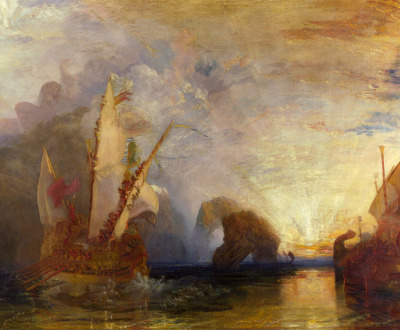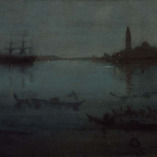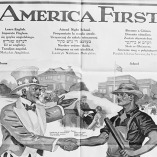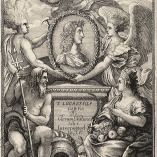
Ulysses deriding Polyphemus, by J.M.W. Turner, 1829. Wikimedia Commons.
“In a famous episode, he says his name is Nobody, which in a way is obviously a lie,” says writer, scholar, and translator Daniel Mendelsohn in this episode of The World in Time. “But in another way is sort of true because he has become a nobody, right? And another way to describe the sort of narrative arc of The Odyssey is: he has to go from being a nobody and reclaim his identity and be a somebody again. So, the question of the nature of identity—you know, he’s been changed by twenty years of aging, by trauma, by terrible suffering, and yet when he gets home, he has to ‘prove,’ quote-unquote, that he is the same person who left. And that, I think, raises one of the most fascinating questions of the epic—and this speaks to something we know about from our own lives—which is: is there a part of you that remains the same despite the changes that we undergo in life? And that’s the sort of paradox, I think, that’s at the center of the poem. Everybody changes in twenty years, and yet you feel the same in many ways. The Odyssey delves into these very profound questions.”
This week’s episode of The World in Time is the first in a series of episodes about The Sea (Summer 2013). Donovan Hohn speaks with Daniel Mendelsohn about his new translation of The Odyssey, traveling back to antiquity in search of the origins of the Homeric epic. Then, in archival audio from 2013, editorial board member Aidan Flax-Clark interviews Lewis H. Lapham about his childhood reading of Moby-Dick, about Lapham’s greenhorn voyages, and about a doomed shipwreck hunt in the early 1960s that Lapham wrote about for The Saturday Evening Post.
WORKS CITED
[In order of mention.]
Homer. The Odyssey. Translated and introduced by Daniel Mendelsohn. Chicago: University of Chicago Press, 2025.
Herman Melville. Moby-Dick: A Norton Critical Edition. Edited by Hershel Parker. New York: W.W. Norton, 2017.
Daniel Mendelsohn. Three Rings: A Tale of Exile, Narrative, and Fate. Charlottesville: University of Virginia Press, 2020.
Jenny Strauss Clay. Homer’s Trojan Theater: Space, Vision, and Memory in the Iliad. Cambridge: Cambridge University Press, 2011.
Daniel Mendelsohn. An Odyssey: A Father, a Son, and an Epic. New York: Vintage, 2018.
C.P. Cavafy. Cavafy: Poems. Edited and Translated by Daniel Mendelsohn. New York: Everyman’s Library, 2014.
Homer. The Iliad of Homer. Translated by Richmond Lattimore. Introduced and notated by Richard Martin. Chicago: University of Chicago Press, 2011.
Homer. The Odyssey of Homer. Translated by Richmond Lattimore. New York: Harper, 2007.
Daniel Mendelsohn. The Lost: A Search for Six of Six Million. New York: Harper, 2022.
Robert Gottlieb. Avid Reader: A Life. London: Picador, 2017.
Aristotle. The Poetics of Aristotle. Translated by Stephen Halliwell. Chapel Hill: University of North Carolina Press, 1987.
M.L. West. The Epic Cycle: A Commentary on the Lost Troy Epics. Oxford: Oxford University Press, 2013.
Aeschylus. The Oresteia. Translated by Robert Fagles. New York: Penguin Classics, 1984.
Jerome Moran. “The Composition and Transmission of the Homeric Poems: A Summary,” The Journal of Classics Teaching, August 2021.
Homer. The Odyssey. Translated by Emily Wilson. New York: W.W. Norton, 2018.
Lewis H. Lapham. “Sea Change,” Lapham’s Quarterly, Summer 2013: The Sea.
Lewis H. Lapham. “Wacky Search for Gold,” The Saturday Evening Post, December 14, 1963.






